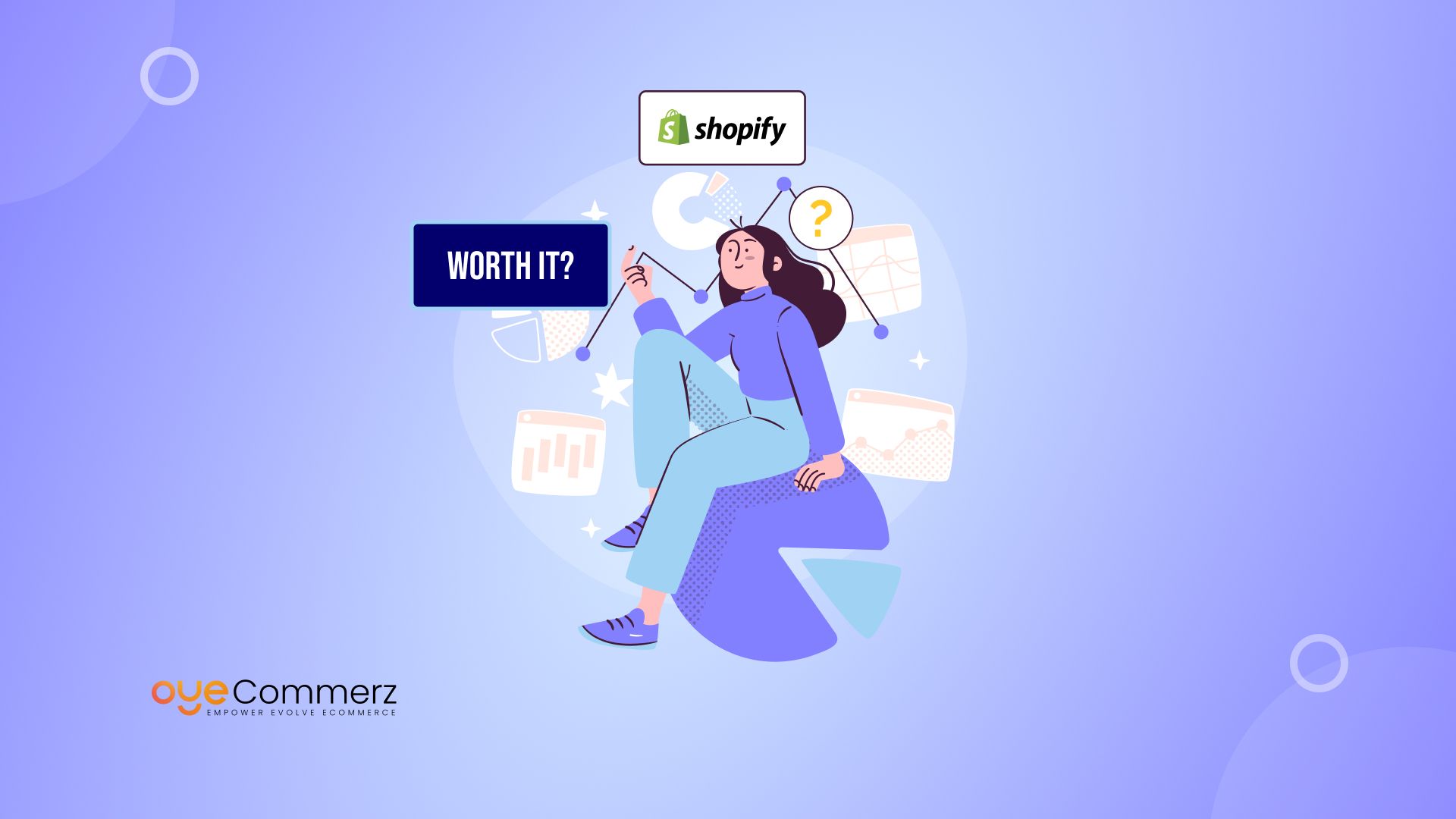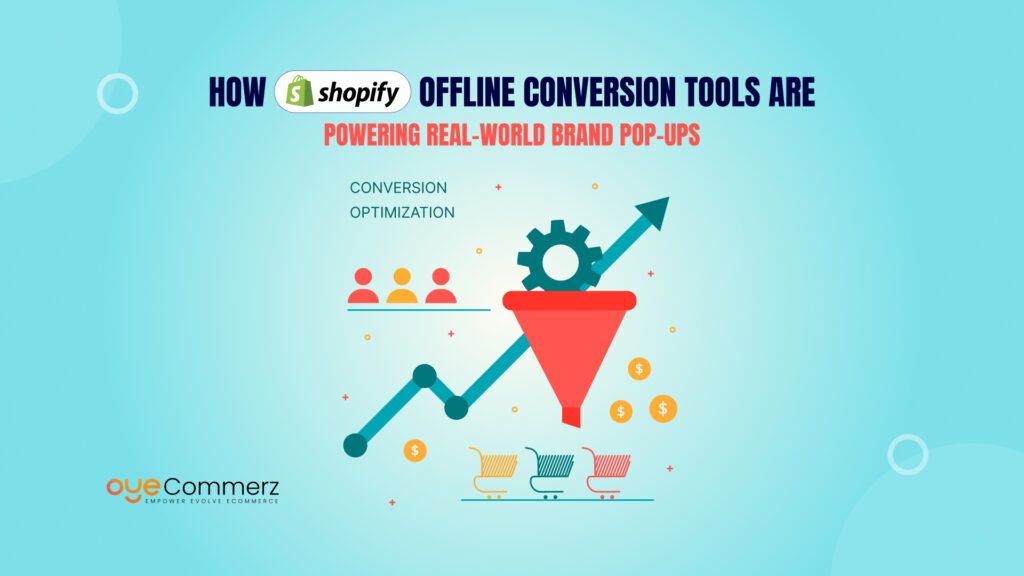Is investing in Shopify app development in 2025 a smart move for your business? If you’re an existing Shopify business owner looking to scale, automate tasks, or improve customer experience, the right app can be a game-changer. But with thousands of apps already in the Shopify App Store, is it worth building your own?
Here’s a fact: custom Shopify apps can boost store efficiency by up to 40% by automating operations, personalizing customer journeys, and integrating powerful third-party tools.
In this guide, we’ll break down the true value of Shopify app development, comparing costs, benefits, and whether you should go for a custom app or an off-the-shelf solution. Let’s dive in and see if this investment makes sense for your business in 2025!
Table of Contents
ToggleUnderstanding Shopify for Beginners
If you’re new to Shopify App Development or e-commerce in general, this section will help you understand why Shopify is one of the best platforms for launching and scaling an online business.
What is Shopify?
Shopify is a leading e-commerce platform that allows businesses of all sizes to create and manage online stores. Whether you’re selling physical products, digital downloads, or services, Shopify provides a user-friendly interface, built-in tools, and a vast marketplace of apps to enhance store functionality.
Why is Shopify Popular in the U.S.?
Shopify has gained massive popularity in the U.S. due to:
✅ Ease of Use – No coding skills required to set up a store.
✅ Scalability – Works for small businesses, mid-sized companies, and enterprises.
✅ Customizable Apps – Thousands of apps available for marketing, automation, and analytics.
✅ Secure & Reliable – Shopify ensures secure transactions and 24/7 uptime.
✅ Multi-Channel Selling – Sell on your website, Amazon, Walmart, eBay, and social media platforms.
How Shopify App Development Enhances E-commerce Businesses
Shopify’s core platform is powerful, but businesses often need additional features tailored to their needs. That’s where Shopify App Development comes in. Shopify apps help merchants:
- Improve customer experience with personalized recommendations.
- Automate inventory management, order tracking, and fulfillment.
- Optimize marketing efforts through email automation, SEO, and retargeting.
- Enhance store performance with speed optimizations and analytics tools.
Key Benefits of Using Shopify in 2025
As e-commerce continues to evolve, Shopify remains ahead of the curve with:
🔹 AI-Powered Features – Advanced automation and chatbot integrations.
🔹 Headless Commerce Capabilities – Custom storefronts with API-driven architecture.
🔹 Mobile-First Optimization – Fast-loading mobile stores for higher conversions.
🔹 Seamless Payment Solutions – Integrated with Shopify Payments, PayPal, Stripe, and more.
Whether you’re launching a new e-commerce store or migrating from another platform, investing in Shopify App Development can significantly boost your business growth.
Shopify App Development: The Basics
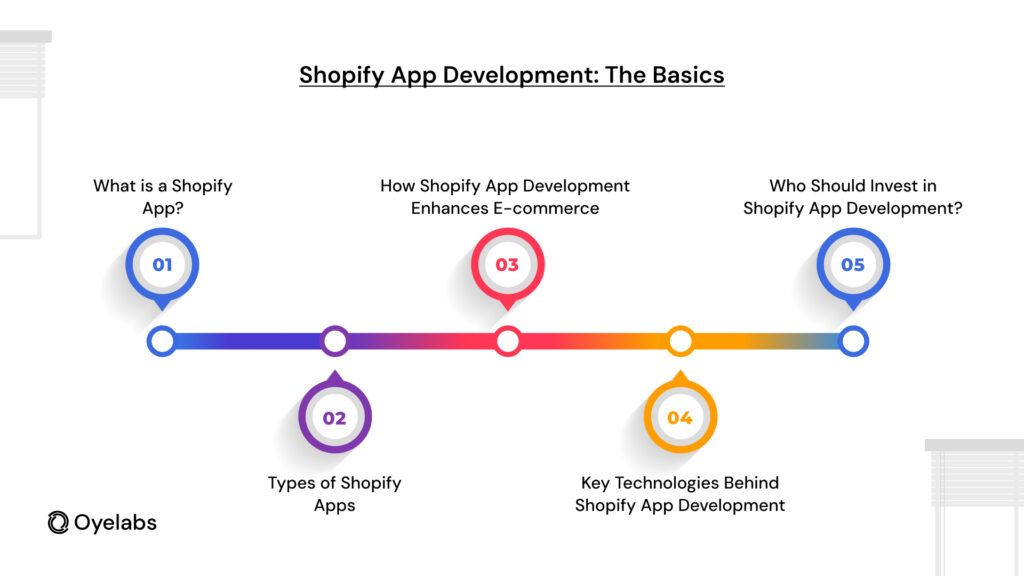
As Shopify continues to dominate the e-commerce space, businesses are leveraging Shopify App Development to enhance store functionality, automate operations, and improve customer experience. Whether you’re a merchant looking for custom solutions or a developer exploring Shopify’s ecosystem, understanding the basics of Shopify apps is crucial.
What is a Shopify App?
A Shopify app is a software application designed to extend the functionality of a Shopify store. These apps allow businesses to integrate additional features that are not available in Shopify’s core platform, helping merchants optimize their sales, marketing, and operations.
Types of Shopify Apps
There are three main types of Shopify apps, each catering to different business needs:
1️⃣ Public Apps – Available on the Shopify App Store, these apps are built for general use by multiple merchants. They offer ready-made solutions for marketing, SEO, inventory management, and more. Examples include Klaviyo, Oberlo, and ReCharge.
2️⃣ Custom Apps – Developed for a specific Shopify store, these apps provide tailored solutions that integrate seamlessly with a merchant’s business operations. They are ideal for businesses with unique requirements that off-the-shelf apps cannot meet.
3️⃣ Private Apps – Created exclusively for a single Shopify store and not listed on the App Store. These apps are typically used by larger businesses that need custom functionalities without making them publicly available.
How Shopify App Development Enhances E-commerce
Investing in Shopify App Development allows businesses to:
✅ Automate repetitive tasks like order processing and inventory management.
✅ Personalize customer experiences with AI-driven recommendations.
✅ Improve marketing with advanced analytics, abandoned cart recovery, and SEO tools.
✅ Enhance multi-channel selling by integrating with Amazon, eBay, and social media.
Key Technologies Behind Shopify App Development
Shopify provides a robust development ecosystem, enabling developers to create high-performance apps using:
- Shopify API (REST & GraphQL) – For retrieving store data and performing backend operations.
- Shopify App Bridge – For embedding apps seamlessly within the Shopify admin panel.
- Shopify Polaris – A design system to create a seamless user experience.
- Liquid – Shopify’s templating language for building custom storefronts.
- Node.js & React – Commonly used for developing scalable and interactive Shopify apps.
Who Should Invest in Shopify App Development?
- E-commerce merchants who need custom features to optimize their business.
- Tech entrepreneurs looking to create and monetize Shopify apps.
- Agencies & developers building apps for multiple Shopify clients.
As Shopify’s ecosystem continues to grow, Shopify App Development presents a massive opportunity for businesses to scale and innovate in 2025.
Why Businesses Are Investing in Shopify App Development in 2025
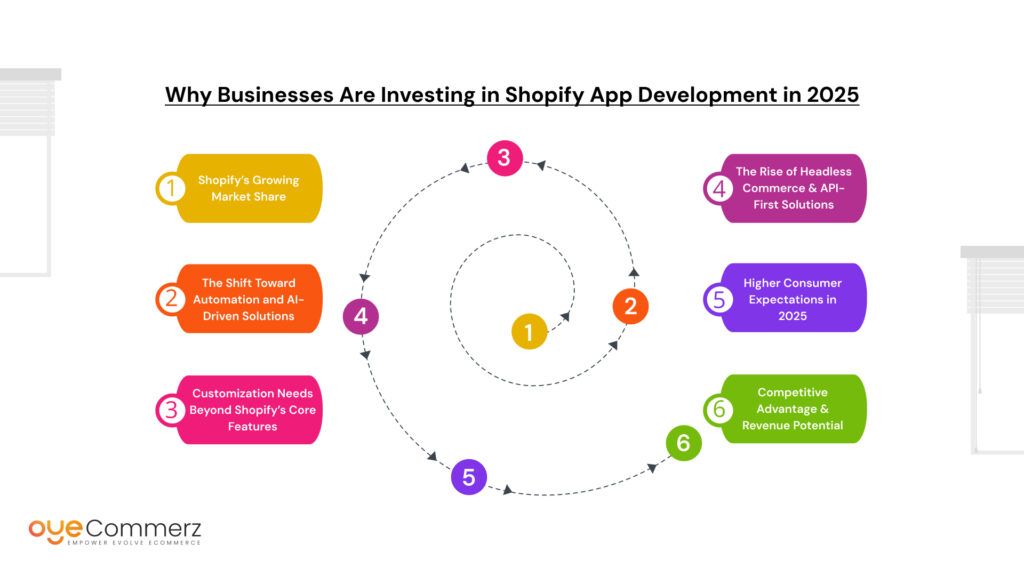
E-commerce is evolving rapidly, and businesses need Shopify App Development to stay ahead of the competition. As more merchants adopt Shopify, the demand for custom apps that enhance functionality, streamline operations, and improve customer experience continues to rise. But what makes Shopify app development a worthwhile investment in 2025? Let’s explore the key reasons.
1. Shopify’s Growing Market Share
Shopify has become a dominant player in the U.S. e-commerce market, powering over 4.5 million online stores (and counting). With increasing adoption from both small businesses and large enterprises, there’s a massive opportunity for businesses to develop apps that cater to specific merchant needs.
2. The Shift Toward Automation and AI-Driven Solutions
In 2025, automation is no longer a luxury—it’s a necessity. Businesses are investing in Shopify App Development to:
✅ Automate inventory management and order fulfillment.
✅ Personalize customer experiences with AI-powered recommendations.
✅ Streamline customer support with chatbots and automation tools.
✅ Improve marketing through automated email campaigns and retargeting ads.
3. Customization Needs Beyond Shopify’s Core Features
While Shopify offers built-in tools, merchants often require additional features tailored to their specific business model. Shopify App Development allows businesses to create:
🔹 Custom checkout experiences to improve conversions.
🔹 Advanced reporting and analytics dashboards.
🔹 Subscription management systems for recurring revenue.
🔹 Multi-store integrations for brands selling across different regions.
4. The Rise of Headless Commerce & API-First Solutions
Headless commerce is a game-changer, allowing businesses to separate the front-end shopping experience from the backend platform. Shopify’s APIs enable developers to:
🚀 Build custom storefronts with React, Vue.js, or Next.js.
🚀 Create seamless integrations with mobile apps, marketplaces, and POS systems.
🚀 Deliver a faster, more flexible, and personalized shopping experience.
5. Higher Consumer Expectations in 2025
Shoppers expect more than just an online store—they want a seamless, engaging, and personalized shopping journey. Businesses investing in Shopify App Development can:
📌 Enhance user experience with faster load times and intuitive navigation.
📌 Improve loyalty with gamification, rewards, and membership programs.
📌 Offer flexible payment options like Buy Now, Pay Later (BNPL) and cryptocurrency payments.
6. Competitive Advantage & Revenue Potential
Developing a Shopify app isn’t just about improving your own store—it’s also an opportunity to generate revenue. Businesses can:
💰 Monetize apps by selling them on the Shopify App Store.
💰 Offer SaaS-based Shopify apps with subscription-based pricing.
💰 Develop exclusive apps that give them an edge over competitors.
With Shopify’s continued growth and the increasing demand for customized solutions, Shopify App Development is a smart investment for businesses in 2025.
Technical Aspects of Shopify App Development
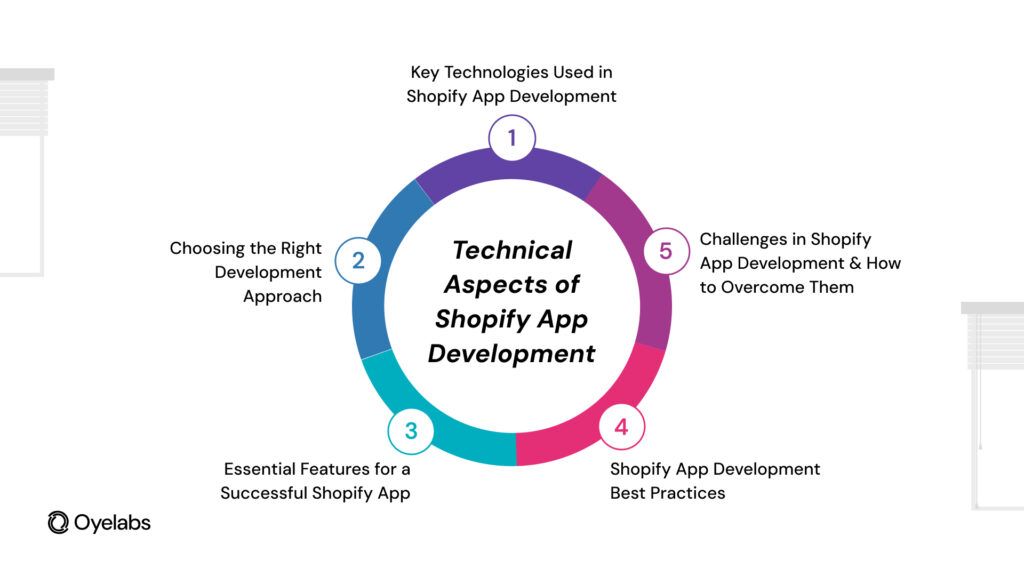
As Shopify continues to expand its ecosystem, businesses and developers need to understand the technical side of Shopify App Development to build powerful, scalable, and efficient applications. Whether you’re creating an app for the Shopify App Store or a custom solution for a specific store, knowing the key technologies and best practices is essential.
1. Key Technologies Used in Shopify App Development
Shopify provides a robust set of tools and APIs that enable developers to build apps that seamlessly integrate with its platform. Some of the core technologies include:
🔹 Shopify API – The backbone of Shopify App Development, allowing apps to interact with store data.
- REST API – Standard API for retrieving, updating, and deleting store information.
- GraphQL API – A more efficient alternative that allows apps to request only the data they need.
🔹 Shopify App Bridge – Used to build embedded apps that integrate seamlessly within Shopify’s admin panel.
🔹 Shopify Polaris – A design system that ensures Shopify apps maintain a consistent look and feel.
🔹 Liquid – Shopify’s templating language, used to customize storefronts and themes.
🔹 Popular Tech Stacks for Shopify Apps –
- Front-end: React, Vue.js, Next.js
- Back-end: Node.js, Ruby on Rails, Python, PHP
- Databases: PostgreSQL, MySQL, Firebase
2. Choosing the Right Development Approach
Depending on business needs, there are three primary approaches to Shopify App Development:
✅ Public Apps – Apps that are built for a wide audience and listed on the Shopify App Store. These require approval from Shopify and must follow strict guidelines.
✅ Custom Apps – Tailored apps developed for a specific store, often used to add custom features or integrations. Unlike public apps, these do not require Shopify’s approval.
✅ Private Apps – Legacy apps designed for a single store but built without using Shopify’s latest security protocols. Shopify has phased these out in favor of Custom Apps.
3. Essential Features for a Successful Shopify App
For an app to be successful in the Shopify ecosystem, it should include:
🚀 Seamless Integration – Easy connection with Shopify’s API and third-party services.
🚀 User-Friendly Interface – Built using Shopify Polaris for a consistent UI/UX.
🚀 Secure Authentication – OAuth 2.0 for secure user login and data access.
🚀 Scalability – Ability to handle increasing traffic and store data efficiently.
🚀 Mobile Optimization – Ensure compatibility with Shopify’s mobile admin and storefronts.
4. Shopify App Development Best Practices
🔹 Follow Shopify’s App Review Guidelines – Ensure compliance with Shopify’s policies if submitting to the App Store.
🔹 Prioritize Performance & Speed – Optimize database queries and API calls for faster load times.
🔹 Ensure Data Security – Use HTTPS, encrypt sensitive data, and comply with Shopify’s security standards.
🔹 Regularly Update & Maintain – Shopify frequently updates its APIs; apps should be maintained accordingly.
5. Challenges in Shopify App Development & How to Overcome Them
⚠️ API Rate Limits – Shopify limits the number of API requests per second. Solution: Optimize API calls using GraphQL.
⚠️ Shopify Approval Process – Public apps must pass a strict review process. Solution: Follow Shopify’s guidelines carefully.
⚠️ Cross-Platform Compatibility – Apps should work seamlessly across different devices and screen sizes. Solution: Use responsive design and test on various devices.
Shopify App Development requires a blend of technical expertise, a strong understanding of Shopify’s ecosystem, and a focus on user experience. Whether you’re a business looking to build a custom app or a developer entering the Shopify marketplace, mastering these technical aspects will help you create high-quality, scalable apps in 2025.
Cost of Shopify App Development
Investing in Shopify App Development can be a game-changer for e-commerce businesses, but understanding the costs involved is crucial. Whether you’re building a custom app for your store or developing a public app for the Shopify App Store, the total investment depends on factors like complexity, features, and ongoing maintenance. Let’s break down the costs of Shopify app development in 2025.
1. Factors Affecting the Cost of Shopify App Development
Several factors determine the overall cost of developing a Shopify app:
🔹 App Type:
- Public Apps – Require additional compliance with Shopify’s guidelines, adding to development time and cost.
- Custom Apps – Tailored for a single business, often more cost-efficient but not monetizable on the App Store.
🔹 Features & Complexity:
- Simple apps (e.g., email pop-ups, basic analytics) cost less.
- Advanced apps (e.g., AI-powered recommendations, multi-channel integrations) require more investment.
🔹 Development Team:
- Hiring freelancers is cost-effective but may lack long-term support.
- Partnering with a Shopify app development agency ensures high quality but at a higher cost.
- Building in-house requires ongoing salaries and resources.
🔹 Technology Stack:
- Apps using Shopify’s GraphQL API and modern frameworks like React, Node.js, and Laravel may require higher expertise, impacting cost.
🔹 API Integrations & Third-Party Tools:
- Connecting with services like Stripe, PayPal, CRM systems, or AI tools can increase development expenses.
🔹 Ongoing Maintenance & Updates:
- Shopify frequently updates its API, requiring regular maintenance to keep apps functional.
2. Shopify App Monetization: Can You Make Money from Your App?
Yes! Shopify app development isn’t just an expense—it’s a revenue opportunity. Here’s how you can make money:
Subscription Model: Charge merchants a monthly fee for using your app.
One-Time Payment: Offer a fixed-price model for lifetime access.
Freemium Model: Provide a free version with paid premium features.
Revenue Share: Earn commissions from sales made through your app.
If you’re an e-commerce business looking to enhance your Shopify store or a developer aiming to monetize an app, Shopify App Development is a worthwhile investment. While costs vary based on complexity, the potential for automation, efficiency, and additional revenue makes it a smart choice for 2025.
Contact to Migrate your Site to Shopify Now
Shopify App Development vs. Off-the-Shelf Apps: Which One is Right for You?
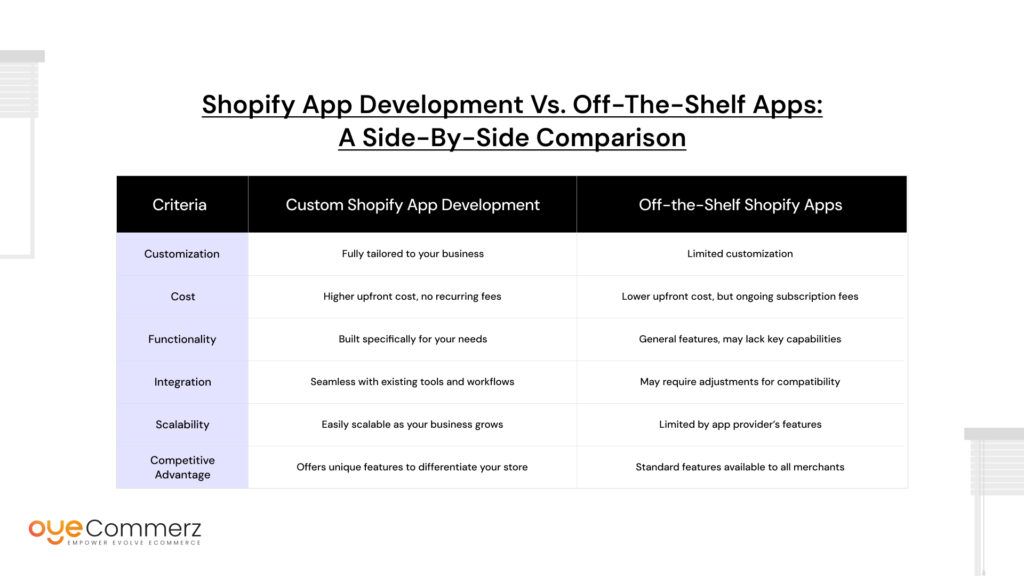
When it comes to enhancing your Shopify store, you have two main options: custom Shopify App Development or using an existing off-the-shelf app from the Shopify App Store. Both options have their advantages and drawbacks, and the right choice depends on your business needs, budget, and long-term goals.
1. What is Custom Shopify App Development?
Custom Shopify App Development involves building a tailor-made app specifically for your Shopify store. These apps are designed to meet unique business requirements that cannot be fulfilled by standard Shopify apps.
✅ Pros:
- Fully tailored to your business needs.
- Seamless integration with your existing workflows.
- No unnecessary features or extra costs for unused functionalities.
- Better performance and optimization for your store.
- Competitive advantage with unique functionalities.
❌ Cons:
- Higher upfront development costs.
- Takes time to build and test.
- Requires ongoing maintenance and updates.
2. What are Off-the-Shelf Shopify Apps?
Off-the-shelf apps are pre-built applications available in the Shopify App Store. These apps serve general business needs like SEO, email marketing, inventory management, and customer support.
✅ Pros:
- Quick and easy to install.
- Lower initial cost (usually a subscription-based model).
- Developed and maintained by third-party providers.
- Suitable for general business functions.
❌ Cons:
- May not offer all the features you need.
- Can lead to compatibility issues with other apps.
- Subscription fees can add up over time.
- Less flexibility in customization.
3. Which Option is Best for Your Business?
🔹 Choose Custom Shopify App Development if:
✔ You need a highly specialized app for your business.
✔ You want complete control over features and performance.
✔ You aim for long-term cost savings and scalability.🔹 Choose an Off-the-Shelf App if:
✔ You need a quick, budget-friendly solution.
✔ The available apps meet your business requirements.
✔ You don’t want to worry about app maintenance.Final Thoughts
If you need an app that aligns perfectly with your business goals and provides a competitive edge, investing in Shopify App Development is the best option.
How to Get Started with Shopify App Development
If you’ve decided to invest in Shopify App Development, the next step is understanding the development process. Whether you’re a business owner looking to build a custom app or a developer planning to enter the Shopify ecosystem, here’s a step-by-step guide to getting started.
1. Define Your App’s Purpose & Goals
Before you start coding, it’s crucial to outline:
✅ What problem your app will solve.
✅ Who your target audience is (Shopify merchants, customers, or both).
✅ Whether you’re building a public or custom app.
✅ How your app will integrate with Shopify’s existing features.
💡 Example: If you’re developing a loyalty program app, determine how it will track points, reward customers, and integrate with Shopify’s checkout system.
2. Choose the Right Tech Stack
To develop a high-performance Shopify app, you’ll need the right combination of tools and technologies.
🔹 Backend Development:
- Node.js (popular for Shopify apps)
- Ruby on Rails (preferred by many Shopify developers)
- Python, PHP, or Laravel (other alternatives)
🔹 Frontend Development:
- React.js + Polaris (Shopify’s design system for UI consistency)
- Vue.js or Next.js (alternative frontend frameworks)
🔹 Database Options:
- PostgreSQL, MySQL, Firebase
🔹 APIs & Authentication:
- Shopify GraphQL API (for optimized data fetching)
- Shopify REST API (for basic data interactions)
- OAuth 2.0 (for secure authentication)
3. Set Up a Shopify Developer Account
To build and test your app, you’ll need to:
🔹 Sign up for a Shopify Partner account (partners.shopify.com).
🔹 Create a development store for testing.
🔹 Generate API credentials to access Shopify’s platform.
4. Start Coding Your Shopify App
Follow these steps:
✅ Step 1: Set up a local development environment using Shopify CLI.
✅ Step 2: Use Shopify’s APIs to fetch and modify store data.
✅ Step 3: Implement authentication via OAuth 2.0.
✅ Step 4: Build the user interface using Shopify Polaris for a seamless merchant experience.
✅ Step 5: Test your app thoroughly in a Shopify development store.
💡 Pro Tip: Use GraphQL instead of REST API for faster and more efficient data retrieval.
5. Test & Debug Your Shopify App
Before launching, ensure your app:
🚀 Works seamlessly with Shopify stores.
🚀 Is optimized for speed and security.
🚀 Doesn’t conflict with existing Shopify apps.
🚀 Has a user-friendly interface and clear instructions.
6. Submit to the Shopify App Store (For Public Apps)
If you’re developing a public app, you’ll need to submit it to the Shopify App Store for approval.
📌 Follow Shopify’s app review guidelines to avoid rejections.
📌 Ensure proper documentation and a clear onboarding process.
📌 Prepare a pricing model (free, one-time payment, or subscription).
💡 Pro Tip: The approval process can take 2-4 weeks, so plan accordingly.
7. Launch & Market Your Shopify App
Once your app is live, promote it to attract users:
📢 Optimize your Shopify App Store listing with keywords and screenshots.
📢 Run paid ads and influencer partnerships.
📢 Offer a free trial to encourage downloads.
📢 Get customer reviews to build trust.
8. Maintain & Update Your App
Shopify frequently updates its APIs and policies. To keep your app functional:
🔹 Monitor API changes and update your app accordingly.
🔹 Regularly add new features based on user feedback.
🔹 Ensure data security and compliance with Shopify’s terms.
Getting started with Shopify App Development requires planning, technical expertise, and ongoing support. Whether you’re building a public app or a custom solution, following these steps will help ensure success.
Conclusion
As the e-commerce landscape continues to evolve, Shopify App Development remains a powerful investment for businesses looking to enhance their store’s functionality, automate processes, and provide a better shopping experience. Whether you’re a merchant seeking a custom solution or a developer looking to monetize an app, Shopify’s flexible ecosystem offers endless opportunities.
Key Takeaways:
✅ Custom Shopify Apps provide tailored solutions that give businesses a competitive edge.
✅ Public Apps offer a lucrative revenue stream for developers in the Shopify App Store.
✅ Shopify’s APIs, Polaris, and GraphQL make development efficient and scalable.
✅ The right approach (custom vs. off-the-shelf) depends on your budget, needs, and long-term goals.
✅ Ongoing maintenance and updates are essential for long-term success.
Is Shopify App Development Right for You?
If you’re an e-commerce business looking for custom features or an entrepreneur aiming to launch a successful Shopify app, now is the time to invest. With Shopify’s growing market share and increasing demand for innovative solutions, Shopify App Development is a worthwhile investment in 2025.
Need Help with Shopify App Development?
Whether you need a custom Shopify app or are looking to migrate to Shopify, our expert developers at Oyecommerz are here to help! 🚀
📩 Contact us today for a free consultation!

